In order to further promote the construction of first-class courses for undergraduates and postgraduates under the background of the new liberal arts, the School of Foreign Studies of China University of Petroleum (East China) successfully held the First High-end Forum for the Construction of First-class New Liberal Arts Courses on November 1st, 2020. More than 200 scholars from universities all over the country participated online.
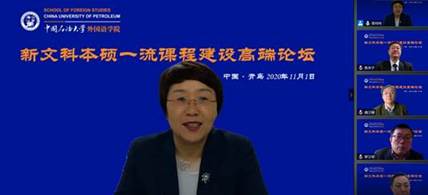
Welcome speech by Vice President Zhang Lingling
Vice President Zhang Lingling delivered a welcome speech at the opening ceremony. On behalf of the University, she expressed gratitude to the experts for their insights and the enthusiastic participation of scholars from all over the country. She emphasized that curriculum is the core element of talent training. To deepen the reform of education and teaching, the reform results must be implemented in curriculum construction. She pointed out that the forum discussed the first-class courses construction of both undergraduates and postgraduates, which was forward-looking and pragmatic, reflecting the efforts to link up the first-class courses with undergraduates and postgraduates, to collaboratively innovate the courses, and to form a first-class curriculum construction and talent training system. Researcher Zhang Yongning, secretary of the School Party Committee, presided over the opening ceremony of the forum.
Eight leading foreign language scholars were invited to discuss the frontier issues of first-class curriculum construction online. Professor Luo Lianggong of Central China Normal University, Professor Sun Jisheng, Vice President of China Foreign Affairs University, Professor Luo Weihua of Dalian Maritime University, Professor Li Yi of Shandong University of Finance and Economics, Professor Feng Guangwu of Guangdong University of Foreign Studies, Professor Xie Shijian of Guangxi Normal University, Professor Liu Kedong of Harbin Institute of Technology, Professor Qu Wei Guo of Fudan University and others successively gave keynote speeches for the conference, which were insightful and brilliant.

Keynote speech by Professor Luo Lianggong
Reform and Construction of Comprehensive English Courses for English Majors. Taken the reform of Comprehensive English as an example, Professor Luo proposed the idea of disciplinary reform of English language courses and answers the fundamental questions of why and how to achieve disciplinarity. Relying on the course materials construction of Comprehensive English, Professor Luo explained the disciplinary construction path of language skill courses from four elements and three levels in detail. He also expounded the comprehensive reform for skill courses of foreign languages and aimed to solve its rootlessness problem, providing a useful reference for the construction of a foreign language curriculum ecosystem.
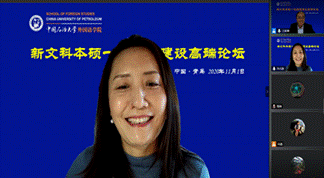
Keynote speech by Professor Sun Jisheng
Reflections on the Training of Chinese Foreign Language Talents in the Post-epidemic Era: Combined with the new tasks facing China’s diplomacy, Professor Sun talked about the changing role of China in post-epidemic era, and focused on how China’s foreign language talent training should balance foreign language ability and language itself, foreign languages and other majors, Chinese awareness and global vision, as well as ability and quality. She also focused on the cultivation of talents in global governance, international organizations and professional fields, to solve the pains and blocking points so as to better shoulder the responsibilities and obligations to service national strategy, and provide new perspectives and enlightenment for the construction of foreign language majors and courses.
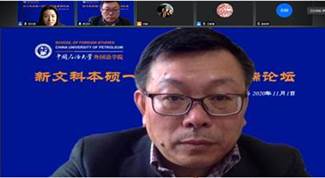
Keynote speech by Professor Luo Weihua
Reflections on the Construction of English Majors under the Background of New Liberal Arts: Professor Luo discussed the relationship between new liberal arts and English major, the compound integration mode of English major and the reform and innovation of English teaching under the background of new liberal arts. According to the national strategies, new English major students should have deep feelings of homeland, and grow into compound talents with high professional quality and strong comprehensive ability to adapt to the Internet era, artificial intelligence era and social needs. In view of the English teaching reform and innovation under the background of new liberal arts, Professor Luo proposed to build a comprehensive interdisciplinary mode and realize the process reorganization and reconstruction of English Education, actively creating a qualified teaching staff and first-class curriculum to meet the new requirements.
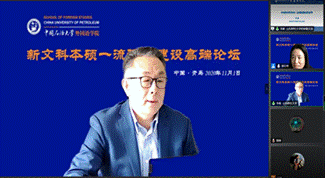
Keynote speech by Professor Li Yi
Thoughts on the Construction of First-class Courses for Foreign Languages Undergraduates: Starting from the overall planning of Director Wu Yan’s “four first-class”, Professor Li told of the plan to take the first-class university as the goal, the first-class discipline as the condition, the first-class undergraduate as the foundation, the first-class specialty as the base, and the curriculum construction as the core. He interpreted Teaching guide for English Majors in detail, and pointed out the specific implementation plan of three majors and put forward more systematic suggestions for colleges and universities. He shared the teaching principles of Shandong University of Finance and Economics on how to improve the students’ critical thinking ability, realizing conceptual change and optimizing curriculum goal orientation.
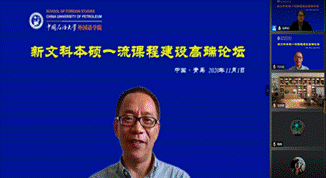
Keynote speech by Professor Feng Guangwu
English Major Positioning and Curriculum System Construction in the New Era: Professor Feng expounded the existing problems of English major from three aspects and thoroughly analyzed its nature and connotation. He also emphasized the humanistic, interdisciplinary and open nature of English major, especially its construction under the background of new liberal arts. Professor Feng made clear the orientation of talent training for English majors, and put forward the idea of multiple orientation of talent training. He pointed out that the orientation of running an English major should be based on the reality of the university and consider the needs of social, economic and cultural development.
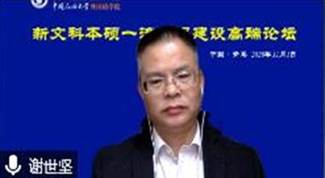
Keynote speech by Professor Xie ShiJian
Thoughts on the Collaborative Development of Foreign Language Teachers’ Teaching and Research Under the Background of First-class Curriculum Construction: Professor Xie pointed out that higher education had entered high-quality development phase. The construction of “double first-class” requires top universities to build first-class disciplines and to cultivate first-class talents, which put forward higher requirements for teacher development, that is, teaching and scientific research need high-quality collaborative development because scientific research is the inevitable requirement of high-quality development. Professor Xie put forward specific requirements from aspects of teaching ability and scientific research ability, and pointed out the direction and path of improving teaching ability and scientific research ability. He also shared the fruitful achievements in teaching and scientific research made by School of Foreign Languages of Guangxi Normal University.
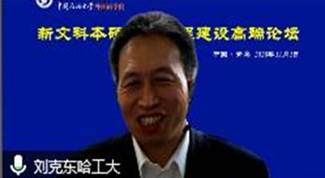
Keynote speech by Professor Liu Kedong
Return to Teaching Itself: Strive to Build First-class Curriculum: Professor Liu showed the thinking and practice of building first-class curriculum from four aspects. He elaborated the systematic policies and measures of Harbin Institute of Technology under the requirements of the Ministry of Education on the construction of five first-class courses, and the teaching and research practice of the curriculum construction of School of Foreign Languages and the fruitful results obtained. Combined with his own experience in building MOOCS to guide specific cases, he pointed out that doing a good job in curriculum construction called for interest and most importantly effort. The lecture is both in-depth and specific, which not only has a theoretical level, but also has crucial guiding significance for the actual curriculum construction practice.
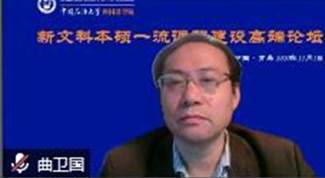
Keynote speech by Professor Qu Weiguo
The Problem of First-class Curriculum Construction in Reading Teaching for English Undergraduate Majors---Take Literary Reading Course as an Example: Starting from how to embody the first-class standard of foreign language majors, Professor Qu analyzed the problems in the construction of foreign language majors’ curriculum. Combining with the 2020 edition of Teaching Guide for Undergraduate Foreign Language and Literature Majors in General Colleges and Universities, taking reading course as an example, Professor Qu deeply analyzed how to carry out teaching around specific systematic knowledge on the basis of principle of generality and diversity, so as to help students establish a stable knowledge system and really improve their critical thinking ability and academic ability in the specific system. The lectures were hosted by Professor Wang Xinbo, Professor Guo Yueqin, Associate Professor Zhao Tingting, Professor Sun Daman and Professor Mao Haoran.
At the closing ceremony, Professor Mao Haoran expressed his heartfelt thanks to the experts for their carefully-prepared lectures with theoretical height, practical path and humanistic atmosphere. He interpreted three “1 modes”: “1:1 mode” means to find the gap to catch up; “1 + 1 mode” means that teaching and scientific research complement each other and course team members nourish each other to achieve 1 + 1 > 2; “0 to 1 mode” requires us to have the courage to try and to seek breakthroughs, achieving several constructive things. At the same time, he put forward three expectations for the development of the School: It should not delay the construction of foreign language discipline in China; It needs full support of many experts; It should be aware of change and achieve leapfrog development.



